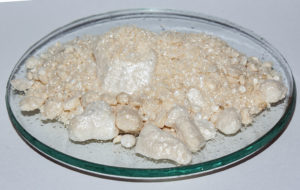Stearic Acid is a fatty acid found primarily in animal derivatives, but in vegetable fats as well.
Uses
- It is used in a variety of cosmetics and personal care products, as a fragrance ingredient, surfactant and emulsifier.
- It is also used as the base for the manufacture of other fatty acid ingredients which are used as emulsifers, emollients and lubricants, according to CosmeticsInfo.org.
- It is also used as an ingredient in candles, plastics, dietary supplements, oil pastels, and for softening rubber; it is a frequent ingredient in soaps made from vegetable oil, and is used to harden the product
Benefits
- Because stearic acid is derived from natural sources and not produced in industrial settings, it is sometimes used as an alternative to chemical ingredients in natural skin care. Often the ingredient is sourced from by-products obtained during the processing of meats, particularly pork. For this reason, it is not frequently used in vegan cosmetics and skin care however; stearic acid sourced from plants is suitable in formulas that are animal-free.
- Because stearic acid helps water and oil mix, the ingredient is also added to many liquid cosmetics and skin and hair care products in low concentrations to function as an additive rather than an active ingredient or cleansing agent. In these products, stearic acid helps prevent the formulas from separating into liquid and oily layers. As a result, products that contain stearic acid require less shaking prior to use and remain more potent when stored for extended periods of time.
Cautions
- Stearic Acid is considered a low to moderate hazard ingredient by the Cosmetics Database, which notes concerns regarding cancer, and lesser concerns regarding neurotoxicity, organ toxicity and irritation. One or more animal studies showed brain and nervous system effects, respiratory effects and skin irritation at very low doses, and in vitro tests on mammalian cells show positive mutation results (leading to its designation as a potential carcinogen).
- However, Stearic Acid is generally considered a safe and mild ingredient when it is concentrations below limits that have been shown to cause irritation.
Interactions
n/a
Other names
Octadecanoic Acid
References
Source: TruthinAging, https://www.truthinaging.com/ingredients/stearic-acid
SkinStore, http://www.skinstore.com/blog/skincare/benefits-stearic-acid/

